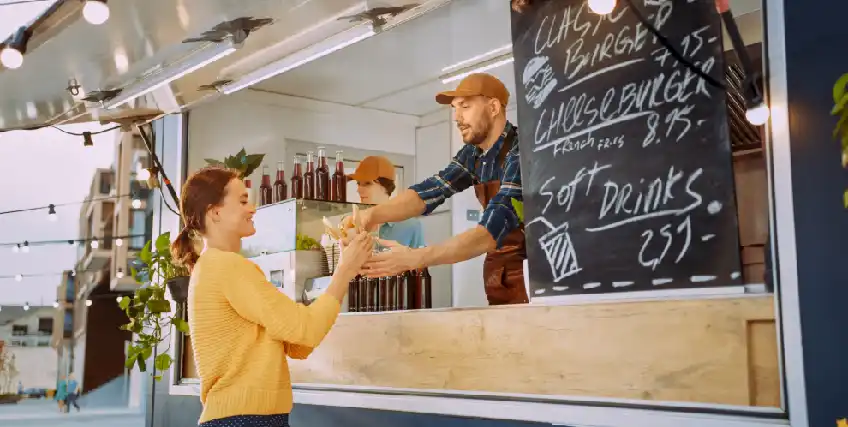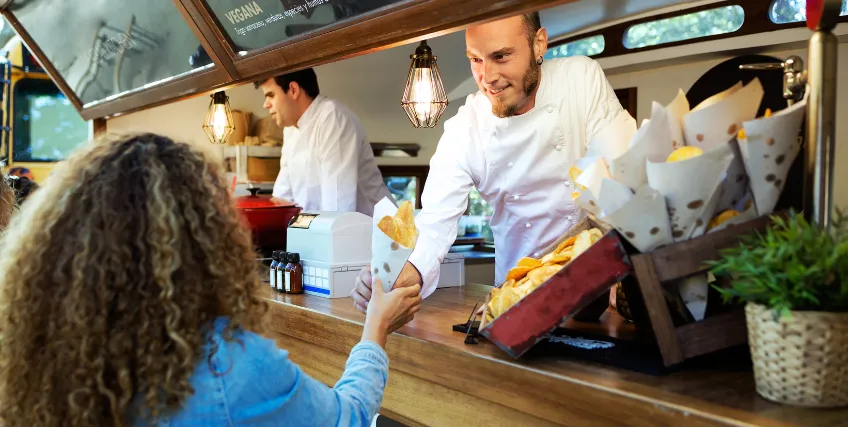Pros and Cons of Buying an Existing Food Truck Business vs. Starting from Scratch
August 21, 2025 | Last Updated on: August 21, 2025

The decision to buy a food truck business or to build your own operation from the ground up is one of the most critical choices any aspiring mobile restaurateur faces.
Both options present unique advantages and challenges, requiring thoughtful consideration before you commit your time and money.
This article will talk about the pros and cons of each approach, be it buying an existing food truck business or starting it from scratch.
Buying an Existing Food Truck Business
Below are some of the key areas which also include the pros and cons that you should consider when you buy a food truck business.
Pros
When you buy a food truck business, you're not simply acquiring a truck; you're typically acquiring a brand, menu, equipment, social media presence, and sometimes even customers. This turn-key approach can launch you into the food truck space rapidly, minimizing the amount of learning required to buy a food truck business from scratch.
When you buy a food truck business that has an established operation, it provides immediate cash flow if the operation is operating and profitable. You can skip much of the initial hassles, including procuring and putting in equipment, dealing with permits, and rolling out marketing initiatives.
An established operation could have already-validated licenses, signage, working equipment, established locations, and supply chain relationships. All these are assets that save a lot of time and money during your start-up phase.
Cons
Though there are positives, to buy a food truck business is risky. You inherit whatever was hidden with the previous owner. Equipment can be old, maintenance records incomplete, and brand image negative. Rebranding costs money if the menu or food truck concept does not suit your taste.
Also, the price to buy a food truck business will generally be substantially more than opening one on your own, particularly if the company has strong bottom lines and an established brand. Due diligence is necessary: strong inspections, financial audits, and market analysis can minimize your risk to buy a food truck business that's losing money or has financial issues.
Brand and menu limitations
Another issue is that you could be saddled with the previous owner's cooking style, customer tastes, and brand image, if there were issues with food safety, food preparation, and if they didn’t have enough cooking equipment.
If you have an aspiration to introduce far-off, different menu items or recipes, it could alienate or perplex regular customers who have come to trust the truck. The existing menu or concept, however, could not be compatible with the current food vogue.
Operational handover and training
Transition periods after the acquisition of a used food truck company can be challenging. Minimal training from the seller or information regarding operations can prove difficult to recover if the business model is not efficiently operated.
These issues are eased with explicit transition terms and a cooperative seller, but new owners should be prepared to take their time to get to know all facets of the company.
Starting a Food Truck Business from Scratch
There are some considerations that you should make when you start a food truck business from scratch.
Pros
When you decide to build a food truck business from the ground up, you can tailor every aspect. You get to pick the truck model, kitchen layout, equipment, menu, brand identity, and marketing strategy. The truck can be constructed to accommodate your cooking style and workflow, not existing configurations that may necessitate costly retrofits to suit your look.
Starting fresh provides you with the chance to build a brand from ground zero, one that reflects your own values, food service, and culinary vision. You'll have full creative control to form recipes, select vendors, and establish your company tone within the market. You're also not saddled with legacy issues, such as old licenses, overhanging debts, failed equipment, or poor customer reviews, so you start from a clean slate.
Cons
Developing something new requires a much greater investment of time, education, and often money up front. You need to acquire a truck, create and equip the kitchen, deal with regulatory permits, become food-safe certified, and build brand recognition from scratch. All these tasks require considerable planning, risk, and investment of resources.
Initial costs, such as commissioning a new truck and buying all the equipment necessary, may be higher than you expect. Delays in obtaining permits or modifying your food truck happen frequently. The process can be overwhelming, particularly for first-time food truck entrepreneurs.
Navigating regulation and location
One of the biggest challenges in opening a food truck business is working through local regulations and finding profitable, legal locations to operate.
Municipal ordinances regarding parking, food handling, permitted operating hours, events attended, and advertising are typically complex and crazily divergent across cities. Compliance is based on thorough research and ongoing watchfulness.
Building a customer base
When you start from scratch, marketing and customer acquisition fall squarely on your shoulders.
Unlike the situation where you buy a food truck business which is established with customers, you need to build your reputation through consistent quality of food, visibility, and brand-building activities. Social media promotions, parades, and partnerships are essential in promoting your new business.
Cost Comparison: Buy a Food Truck Business vs. Buy a New Food Truck
The choice between to buy a food truck business and starting a new food truck venture hinges on budget, goals, and ambition. Buying a new truck is more costly upfront, but it has the benefit of warranties, brand-new equipment, and full customization to suit your needs. New trucks don't depreciate as fast and potentially have fewer initial repairs, but the cost can be too high for startup individuals.
Conversely, to buy a food truck business, particularly a used one, can have lower startup costs, but there is a chance that you will buy an older truck that might need much maintenance just after your acquisition. Warranty protection, looks, and surprise breakdowns will have to be balanced against the cost advantage and established market presence.
Importance of a Food Truck Business Plan
Regardless of which path you take, either buy a food truck business or open one from scratch, a strong food truck business plan is essential. This plan must contain your operational plan, financial projections, menu concepts, market analysis, staffing requirements, permits, insurance, and marketing plan. It is the guide to your venture's long-term success and should be utilized to raise investments or obtain business loans.
A food truck business plan prepares you to address unforeseen costs, operating issues, and shifts in customer demands. By mapping out your goals, strategies, and alternatives, you establish a strong foundation for success, whether buying an existing operation or establishing a new one.
Long-Term Considerations: Sustainability and Growth
Owning a food truck involves ongoing change. Customers' tastes change, competition increases, and regulations change. People who buy a food truck business need to determine if the current brand is adaptable and scalable. Entrepreneurs who opt for a buy a new food truck business strategy should consider scalability and rebranding possibilities from the start.
Networking, online ordering programs, and participation in local events or catering opportunities are what render both models profitable. Smooth operational workflows, financial control, and ongoing community participation are the foundations of long-term sustainability.
Related Article: How to Use a Truck Business Loan to Grow Your Fleet
Final Thoughts
Whether you opt to buy a food truck business that is already in service or build one from the ground up is a function of your entrepreneurial style, risk tolerance, budget, and degree of creative control.
As the food truck trend grows and matures, both routes can lead to lucrative, successful careers for enterprising individuals. Just remember that if you buy a brand-new food truck, buy a turn-key vehicle, or start out solo, meticulous planning, adaptability, and a solid food truck business plan are keys to success in this fast-food market.
FAQs About Buying a Food Truck Business
Is buying a food truck a good investment?
For many small business owners, buying a food truck can be a smart investment. With lower overhead than a traditional restaurant and growing demand for mobile dining, profits are achievable. Just ensure your budget for food truck equipment, licenses, and workers’ compensation. Finding a reliable food truck for sale with proper planning can set you up for success.
What is the main reason food trucks fail?
One of the main reasons food trucks fail is poor cost management. Many small business owners underestimate ongoing expenses like maintenance, permits, insurance, and workers’ compensation. Without a clear budget or proper tracking through a point-of-sale system, hidden costs pile up quickly, even if you got a good deal on a food truck for sale.
What type of ownership is best for a food truck?
An LLC may be considered a good structure for food truck owners. It offers liability protection and flexibility, which appeals to many small business owners. While sole proprietorships and partnerships are easier to start, an LLC better protects your assets, especially when dealing with employees, workers’ compensation, or food truck equipment liabilities.
How profitable is the average food truck?
The average food truck earns a decent profit margin, higher than most brick-and-mortar restaurants. Lower costs for rent, staff, and food truck equipment help small business owners boost their bottom line. Success depends on high-volume locations, cost control, and efficient point-of-sale tools to track inventory and sales.
What insurance does a food truck need?
Food trucks need a Business Owner’s Policy (BOP), which bundles general liability and property insurance. Small business owners should also consider workers’ compensation, commercial auto, and equipment coverage. Whether you're using leased or owned food truck equipment, having the right insurance helps protect against theft, accidents, and fire.
Frequent searches leading to this page
Term Loans are made by Itria Ventures LLC or Cross River Bank, Member FDIC. This is not a deposit product. California residents: Itria Ventures LLC is licensed by the Department of Financial Protection and Innovation. Loans are made or arranged pursuant to California Financing Law License # 60DBO-35839




